Book contents
- Frontmatter
- Dedication
- Contents
- List of Illustrations
- List of Contributors
- Acknowledgements
- List of Abbreviations
- Introduction: Women’s Experiences of the Second World War: Exile, Occupation and Everyday Life
- Part One Living in Exile and under Wartime Occupation
- Part Two Living with Wartime Occupiers
- Part Three Everyday Life at Home and on the Battle Front
- Index
7 - A Moment of Refuge: Transnational Cooperation at Ming Sum School for the Blind in Occupied Canton in the Second World War
Published online by Cambridge University Press: 03 June 2021
- Frontmatter
- Dedication
- Contents
- List of Illustrations
- List of Contributors
- Acknowledgements
- List of Abbreviations
- Introduction: Women’s Experiences of the Second World War: Exile, Occupation and Everyday Life
- Part One Living in Exile and under Wartime Occupation
- Part Two Living with Wartime Occupiers
- Part Three Everyday Life at Home and on the Battle Front
- Index
Summary
The Second World War in Europe began in 1939, yet war in China began in September 1931, when Japan invaded Manchuria and established Manchukuo (1932–45) under Japanese control. After the Marco Polo Bridge Incident in 1937, Republican China (1912–49) declared war on Japan. The Guomindang (GMD, Nationalist Party) and the Chinese Communist Party (CCP) established the National Front, and the war quickly spread. Canton (present day Guangzhou), a key regional metropolitan center in the Pearl River Delta, was targeted by Japanese forces who wanted to stop munitions and military supplies from reaching Chinese troops. The Japanese blockaded railroads from Hong Kong to central China. Canton was poorly defended, and the Japanese military occupied the city in October 1938. Many inhabitants fled the city and went to the British colony of Hong Kong. When Hong Kong fell to the Japanese on Christmas day, 1941, the exiles moved to the Portuguese colony of Macau, or the interior of China. A considerable number of Chinese remained in Canton, as well as a few American Presbyterian missionaries. Alice M. Carpenter (1897–1985) and Alice H. Schaefer (1896–1972) remained at Ming Sum School for the Blind (Mingxin gumu xuexiao) until they were interned as enemy aliens on 7 December 1941, when the United Stated declared war on Japan after the attack on Pearl Harbor. The Chinese Principal of the school, Dr Huang Xuezhen (Wong Suet Ching, b.1881), then replaced her missionary colleagues, and protected blind students until the end of the war in 1945.
This chapter examines the everyday life of these three women – two American and one Chinese – as they worked in Japanese-occupied Canton from 1938 to 1945. Using missionaries’ public and private correspondence to their American audience, as well as official school publications, this chapter demonstrates the cooperation among American and Chinese women under occupation. It illustrates the way ethnic privilege shifted in wartime. The work of the three women enabled the school and its students to survive under occupation with limited resources. This chapter adds to the small literature about women's experiences in Japanese-occupied Canton to provide a wider context to this debate.
- Type
- Chapter
- Information
- Women's Experiences of the Second World WarExile, Occupation and Everyday Life, pp. 113 - 130Publisher: Boydell & BrewerPrint publication year: 2021



